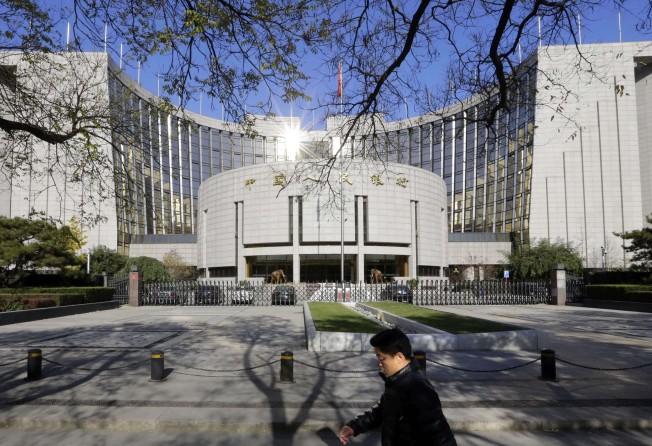Chinese government bonds see record sell-off amid tightening, looming Fed rate rise
Mainland’s 10-year treasury futures plunged by 1.05 per cent on Monday, the biggest one-day drop since the contract started trading

China’s government bond market saw a record sell-off on Monday, extending losses since the start of October.
Bonds are under intense pressure as Beijing continues to tighten regulations in a bid to deleverage the market, and as a near-certain interest rate increase by the US Federal Reserve looms this week.
China’s 10-year treasury futures for March delivery, the most actively traded contract, plunged by 1.05 per cent on the China Financial Futures Exchange, the biggest one-day drop since the contract started trading. The price has declined 2.16 per cent so far in December, following a 1.73 per cent slump in November.
Five-year treasury futures for March delivery were also down by nearly 0.5 per cent on Monday.
The slump comes as China’s government bond yield keeps rising. The yield on the benchmark 10-year government bond with a coupon rate of 2.74 per cent climbed to 3.15 per cent on Monday. A bond price moves inversely to its yield.
“The sell-off in the bond market is partly attributable to the latest tightening measures,” said Ming Ming, the chief fixed-income analyst at Citic Securities in Beijing.
The Chinese authorities tightened leverage rules for exchange-traded bonds in the latest move to rein in risks in the debt market. Under the new regulation, if an investor uses a note rated AA or AA+ as collateral, the amount shouldn’t be more than 10 per cent of the debenture’s total issuance, according to a statement on the website of China Securities Depository and Clearing Corp.
“Borrowing costs keep rising as the authority seems very determined in deleveraging,” according to the latest research note from Huatai Securities.
The tightening of restrictions follows earlier measures to reduce liquidity in the market and to raise borrowing costs to reduce leverage in bond investment.
The People’s Bank of China (PBOC) had been tightening liquidity in the interbank market via open market operations since October. Meanwhile, it has been increasing borrowing costs in the money markets by releasing more long-term liquidity with higher borrowing costs while tightening short-term liquidity with lower borrowing costs, through open market operations as well as non-traditional tools such as the MLF (medium-term lending facility).
In addition, “as the Federal Reserve’s interest rate decision is coming this week, we are only cautiously optimistic about the bond market in the short term,” said Ming.
The Federal Reserve’s monetary policy meeting is due to conclude this Wednesday, with most investors expecting officials to raise rates by a quarter percentage point to between 0.50 per cent and 0.75 per cent.
Under the current circumstances, “the bond market is overwhelmed by negative news from all sides, including surging US treasury yields, continuing regulatory tightening and rising inflation with improved economic fundamentals,” said a trader in Shanghai who preferred not to be named.
Meanwhile, the correction in the bond market is partly due to the latest data showing faster than expected improvement in China’s economic fundamentals, according to Huatai’s research note.
The pressure of rising inflation on the bond market in increasing, according to Huantai’s note.
Deng Haiqing, chief economist at JZ Securities, agreed, saying: “Inflation across the world is in a long-term rising trend and China is also going to see higher inflation, which will be a long-term negative factor for the bond market.”
However, some analysts believe the correction in the bond market is only a short-term trend.
“Higher inflation and higher yield on long-term government bonds are unsustainable, so now it’s time to buy bonds,” said Jiang Tao, chief economist at Haitong Securities, in a research note.